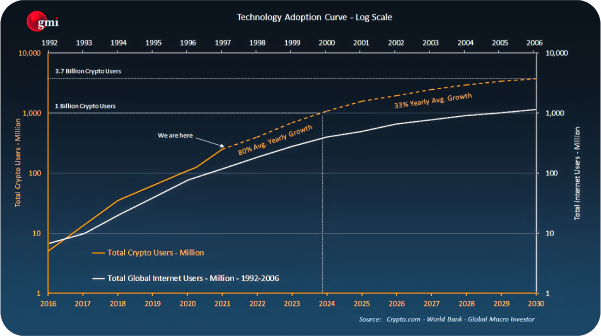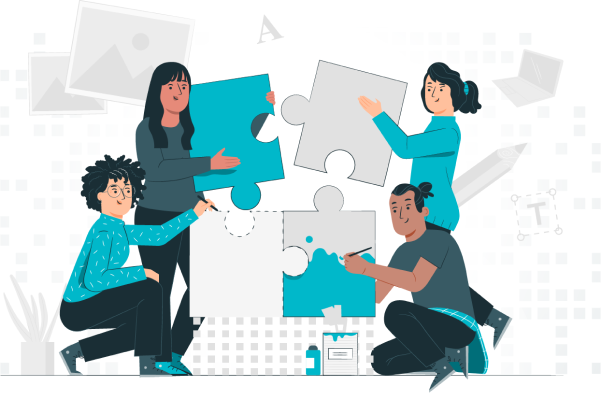Intro
01
02
03
04
Introduction
What if you could access a market valued at $13 trillion by 2030, before the majority of your competitors?
That’s the most recent estimation of the value of the “Metaverse”, according to Citi.¹ While there is still much debate and speculation surrounding the Metaverse (or metaverses, which is the more likely end scenario), there are two fundamental facts to consider:
- The Metaverse is being built on blockchains right now
- The benefits of blockchain are game-changing in their own right
It’s been easy, and understandable, for the majority of the business world to wave off crypto, blockchain, and the metaverse as empty trends. A skeptical approach is, of course, always advisable and often warranted. But think back. Both the world wide web and social media were met with similar skepticism during their formative stages. Those companies that responded fluidly, however, and embraced those new technologies, thrived.
Blockchain can no longer be ignored, or dismissed as a fad.
With that in mind, this eBook will cover:
- What blockchain is
- Impacts and opportunities
- How to get your business blockchain ready
Intro
01
02
03
04
Why Blockchain is Now Impossible to Ignore
Let’s begin with the numbers:
- In 2021, funding for new businesses in the Blockchain industry rocketed to over 700% compared to 2020.²
- A 2021 global blockchain survey by Deloitte found that 76% of executives questioned were convinced digital currencies would be a viable alternative to fiat currencies in global finance in the next 5-10 years.³
- PwC predicts blockchain alone will bring $1.76 trillion to the global economy by 2030, along with 40 million jobs.⁴
- The userbase for Metamask, one of the most popular crypto wallets in the world, jumped from 500k active users in 2020 to over 10 million in 2021.⁵ Metamask has also announced integration with Apple Pay.⁶

Intro
01
02
03
04
What is Blockchain?
In order to understand these advantages, we must first understand the technology. So, what is a blockchain?
It is, in the most simple terms, a database or digital ledger. There are key attributes that set blockchains apart from traditional databases, however:
- Every time new data is written to the blockchain (as a ‘block’) it is permanent, or immutable. It cannot be removed, edited, or altered
- All data recorded on the blockchain is spread across a network of computers, or ‘nodes’. This means there is no central point of failure and no central point of control (it is ‘decentralized’)
- All data is timestamped the moment it is written to the blockchain, making it easy to trace transactions or data journeys in detail
These attributes lead to some powerful inherent advantages over traditional, centralized databases.
Firstly, blockchains are almost impossible to tamper with. Once data has been added, it can’t be removed without extreme effort. Even then, removing or altering data is essentially impossible on public networks due to decentralization.
Secondly, many blockchain networks, such as Ethereum, support smart contracts and NFTs. Smart contracts are pieces of code that automatically execute certain actions based on preselected events or conditions.
NFTs (non-fungible tokens), on the other hand, are different from standard cryptocurrencies. They are not interchangeable with each other. Bitcoins, for example, are always of equal value relative to each other. NFTs are not – instead used to represent single, interchangeable assets including art, wine, property, and so on. This means that any unique digital and real-world assets can be represented on blockchains as an NFT, and coded into smart contracts.
NFT’s have already caused quite a shakeup in the wine industry by allowing easier trading of wine via NFTs, cutting out the middle man. NFTs can also be programmed to pay out royalties when certain conditions are met, meaning producers can potentially receive a cut of every wine trade. This is just one example.
So far so good, but what does all this really mean in practical terms, especially for your business?
To find out, let’s look at some real-world use cases of blockchain across a variety of sectors.
Use Cases
Marketing and Customer Relations
NFTs exploded in 2021, and several big brands were quick to seize the marketing power of this trend. Nike, Visa, and Mcdonald’s were just some examples.
Trends aside, there is even more potential value to NFTs in marketing and customer relations in the long term. Offering customers the opportunity to own something truly unique and personal, based on your brand, or tied to your product, is proving to be a valuable tool in building highly personalized customer relations.
Given the increasing interest and development of Metaverses, marketing NFTs also have huge marketing potential in the digital space. Indeed, organizations including Adidas, Atari, and PwC have already secured virtual land in some metaverses (such as Decentraland and The Sandbox) for precisely this reason.
Counterfeit Protection and Supply Chain Efficiency
All transactions on a blockchain are visible, traceable, and time-stamped. This makes it the perfect way to not only track the authenticity of goods, but also the journey of materials and financial exchanges between parties.
Luxury fashion company LVMH, along with Prada and Cartier, uses blockchain to actively track goods and combat counterfeiting.
Coca-Cola, on the other hand, uses the Ethereum enterprise Baseline Protocol blockchain to optimize its supply chain, which helps to reduce friction and increase the transparency of the process.
Fast, Traceable Financial Transactions and Royalties
Microsoft’s Xbox gaming brand uses blockchain to instantly settle publisher royalties – a process that previously took up to 45 days.
Spotify meanwhile, acquired blockchain Mediachain to help manage copyright and royalty payments, and quickly resolve any issues related to rights holders.
A number of music artists, from Kings of Leon to Snoop Dogg have used NFTs and the Metaverse as a new way to engage with fans and their communities, while also gaining greater control of their creative works by removing the need for middlemen.
These examples are just the tip of the iceberg. We can find many others. Blockchain is already being leveraged by startups in the travel sector to improve efficiency and reduce data friction, for example, and additional use cases include:
- Drone air traffic control
- Virtual litigation
- Environmental, social, and corporate governance tracking
- Education and educational credentials
- Healthcare
- Dispute resolution
- Real Estate
- Car Sales
- Voting
Intro
01
02
03
04
Exploiting the Blockchain Advantage
So, blockchain is here to stay. The companies we briefly examined above were able to quickly leverage blockchain to their advantage for one simple reason: they had a team with the right knowledge.
Finding individuals with this knowledge, however, is currently a major roadblock for the majority of businesses.
Research by cryptoliteracy.org found that in 2021, the overall understanding of cryptocurrencies, and the technology they are built on, blockchain, is generally low.⁷ North and South American participants in the study had an almost 100% failure rate when asked fundamental questions about cryptocurrencies, for example.
Any business serious about using blockchain, or at the very least understanding how it can apply to their sector, must therefore solve this problem.

Capitalizing on Web3 and Blockchain Interest
Understanding of blockchain might be low, but interest in the technology is the highest it’s ever been.
At the time of writing in fact, Web3 and blockchain are attracting the world’s top talent. FAANG and traditional tech company workers are migrating en masse to Web3.⁹ And it’s not just developers – blockchain is now much more than a geek niche.
Cryptocurrency is currently the fastest adopted technology on record, even outpacing the early adoption of the internet. Interest is growing quickly among both consumers and business professionals.

But there is a problem. Knowledge of blockchain is not rising at a similar rate, especially in the business world. This is in part because there is almost no reliable corporate training available, and also because many businesses still aren’t fully aware of the opportunity blockchain presents.
There is already a skills gap in many countries and many sectors. Blockchain knowledge is now another missing link in this chain, with one key difference.
The majority of missing skills are needed to plug often retroactive technology debt. Companies are racing to keep up with, and successfully use, already existing technologies. Blockchain, on the other hand, represents something different. It is new, often overlooked, and innovation-friendly. The advantages of upskilling a team with blockchain knowledge are therefore threefold:
- Future-proofing
- Early adoption
- Innovation
There are further benefits to upskilling. We’ll cover these later, but for now, the following is clear:
- Interest in blockchain and Web3 is growing rapidly among consumers and professionals
- There is a knowledge gap in most industries
- There is a huge opportunity, and long-term benefit, for businesses that can deliver effective blockchain training to their workforce

The Advantages of a Blockchain Trained Team
While your team might be lacking actual blockchain knowledge right now, they already have a massive advantage. They know your industry, and they know your business. This is a crucial piece of the puzzle.
Even the most fundamental knowledge of blockchain will empower anyone in your company to spot potential avenues of innovation or adoption.
Two very broad applications might be:
Marketing and Customer Relations
NFTs and customer reward tracking on blockchains.

More efficient, transparent processes
Smart contracts could streamline internal processes which will also be fully transparent and traceable on the blockchain.

You make the difference
The real power, however, comes from the combination of your team’s industry expertise and their new understanding of blockchain when applied to your industry specialism.
The use of blockchain against fraud by the fashion industry is a great example of applying such knowledge to solve an industry problem.
This doesn’t factor in the potential to build and release new products or services for your industry in Web3 either.
Many companies in the Web3 space are new. They often need the same services other businesses do – consultants, marketing agencies, recruiters, PR, and so on. Not only is there a need for these businesses, but there is also an active and healthy investment focus in the space, as we have seen.
As Web3 matures, filling that demand for full-stack marketing and advertising, user experience optimizations, consulting and branding, accountancy, auditing, and many more, are all gaps that savvy “traditional” businesses can serve. And with limited competition – for now, at least.
Now we’ve covered the basics of the technology, the existing use cases and potential, and the growing interest both in and outside the business world.
The key to unlocking new opportunities and innovations is not just the technology itself of course. It’s your employees. And the right knowledge.

Intro
01
02
03
04
Upskilling Your Team to Blockchain
There are many advantages to training your team in addition to gaining blockchain knowledge. Corporate training can save on recruitment costs, increase retention, and improve morale.
All of this is meaningless without the right training, however. Given blockchain is still so new, finding reliable, accurate, and up-to-date educational content is absolutely fundamental. Before we get to solving that problem, let’s cover some of the additional perks of upskilling your team.
According to research by Talent LMS⁸ :
Why to Upskill

66%
Of employees ranked the joy of learning new things and developing new skills as the top upskilling motivator.

80%
Of employees say that upskilling/reskilling training has boosted their confidence.

42%
Of employees have pursued training on their own after the coronavirus outbreak.

42%
Of companies stepped up their upskilling/reskilling efforts after the coronavirus outbreak.
This shows that overall, employees want to learn. Giving them that opportunity has clear and quantifiable benefits too. Employees that receive training are much more loyal, for one. This can positively impact your reputation through word of mouth and employee recommendations.
Secondly, with a global skills shortage in full swing, it’s tempting to think onboarding new talent is essential. But some, if not all, of that talent may already be in your organization.
A new hire costs a company around $4000 on average as well, often more. It’s also worth noting that realistically, attracting talent from Web3 and blockchain back into more established sectors may be challenging.
If there’s the skill and the will in-house, use it!
Corporate Training with Moralis Academy
The next important question then, is where can you find trusted training and education for your team?
It’s important to note here that understanding blockchain technology doesn’t necessarily require any technical or programming knowledge – anyone can learn the underlying concepts of how a blockchain works.
But understanding the difference between proof of work and proof of stake chains, how blocks are mined and appended to the blockchain, and how networks remain immutable, is highly specialized knowledge. This means that it needs to be taught by experienced professionals.
Because the technology is still fairly new, especially in terms of adoption in the business world, finding these experienced and credible professionals can be tricky.
This is where Moralis Academy can help.
The Academy was originally set up in 2017 by programmer and blockchain expert Ivan Liljeqvist. After becoming Ericsson’s resident blockchain expert, Ivan expanded his scope along with fellow Academy founder Filip Martinsson, to offer professional training and blockchain consultations to organizations across the world.
Their combination of expertise and accessible educational techniques began to increase demand, and this in turn led to the creation of Moralis Academy (originally Ivan on Tech Academy).
Since then the Academy has educated over 40,000 students, many of which have gone on to become leading blockchain entrepreneurs, developers, and Web3 business professionals.
Our courses are taught by industry experts active in the space now, which means you and your team get the very best, most up-to-date, and easily digestible educational content available in this area.
More recently, Ivan and Filip created Moralis Web3, which has quickly become the leading Web3 solution for building decentralized applications.
Moralis Academy, then, has the experience, expertise, and established methods needed to educate professionals quickly, efficiently, and effectively. Our team has been active in blockchain since the beginning, and has more experience providing education in this area than anyone else. As a result, our certificates are also recognized by the blockchain and Web3 industry.
You can find out more about Moralis Academy Business and Corporate training below. We’re always happy to talk about your specific requirements too, so make sure to get in touch.
Contact the Moralis Academy Team: Contact Form
Moralis Academy: https://academy.moralis.io
Moralis Web3: https://moralis.io/
Thanks for reading this eBook. We hope you found it useful.
